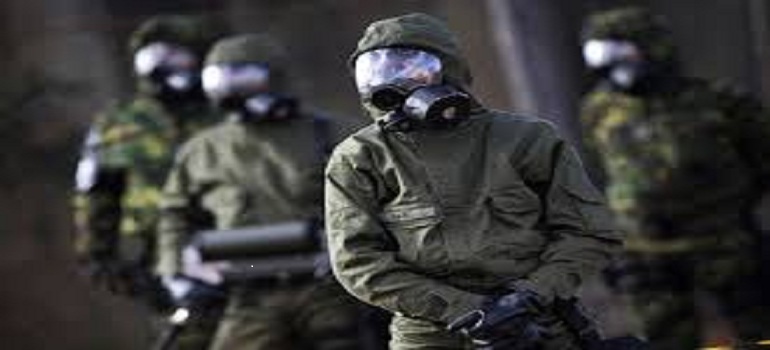Abstract
Day April 29 is International Day for chemical weapons.The first question is whether the use of chemical weapons is permitted or prohibited from perspective of Islam? This article attempts to answer this question. Brief answer to this question is that the use of chemical weapons is prohibited; because of the Quran says: who kills a person, it seems that has killed all mankind.[1]

History of Chemical Weapons
The use of chemical weapons dates back to thousands of years ago.[2] The most use of chemical weapons was in the first world war. In this war over one million and three hundred thousand people were killed by chemical weapons [3] Due to the terrible effects of chemical weapons in World War I, the 1925 Geneva Protocol was signed[4]. Basically, that was held by international community.[5] The full name of the conference is the "Convention on the Prohibition of the Development, Production, Stockpiling and Use of Chemical Weapons and on their Destruction".
Briefly, the first international agreement According to this treaty, Germany and France should not used toxic bullets. In the 1874, in Brussels Convention was adopted that the use of chemical weapons was prohibited in general. In the 1899, a peace conference was held in The Hague, by which, the use of poison gas was banned. In the 1925 Geneva Protocol was signed. Acourding to that the use of chemical weapons and other toxic weapons was banned. In the 1990 global community provided a treaty which by all chemical weapons should be destroyed. In the 1993, the Convention on the Prohibition of Development, Production, Stockpiling and Use of Chemical Weapons and on their Destruction (or the Chemical Weapons Convention, CWC) was ready for signature. In the 1997 it was executed [6] Nowadays the Organization for the Prohibition of Chemical Weapons (OPCW) in The Hague is responsible for the implementation of the Convention. In January 2012 One hundred and eighty-eight countries joined to the organization and have ratified the Convention.[7]
Perspective of Islam about chemical weapons
According to the Quranic verse that Muslims have always maximize their military power as well as have modern weapons; but at the same time the fundamental principles should be also noted and important matter under the conditions had numerous limitations in the divine teachings. In a system of authentic divine that relies on the teachings of revelation can not material interests has unique role in domestic and foreign policy; but also divine and human principles and values must be considered. We are not allowed to use any means to reach the goals, although non-human. Briefly, Islam is commited to ban the use of biological warfare, toxic gases and other suffocating gases. There are some reasons for that:
The use of chemical weapons is prohibited; because from perspective of Quran who killed a person without sin in fact he killed all of humans.[8]
Islam is a religion of mercy and Use of chemical weapons is incompatible with the mercy. Imam Ali (AS) addressed Malek Ashtar saying that: "Behave with mercy, love and grace to the people; because they are your religious brothers or they ar like you in creation."[9]
Prophet (pbuh) prohibited from spraying poison in the land of the infidels; because of killing children, women and the elderly.[10]
Grand Ayatollah Imam Khamenei says about the ban on weapons of mass destruction: The use of weapons of mass destruction is forbidden. In fact it wastes generation. The Quran prohibits it.We do not go looking for it. We go looking for what it truly should fears dominant powers.[11]
Canclusion
From perspective of Islam the production, storage and use of weapons of mass destruction especially the chemical weapons is not only because of its deadly forbidden, but it also is forbidden for religious reasons.
References
[1] Holy Qur'an,Al-Maidah, Verse 32.
[2] https://fa.wikipedia.org/wiki/
[3] The end of the Cold War and the conclusion of the Chemical Weapons Convention, Reza Najafi, thesis Tehran University, 1375, p. 4.
[4] Khateri S, Wangerin R. an Open Wound: consequences of the use of chemical weapons against Iran during the Iran-Iraq war. Tehran Peace Museum publication, 2009
[5] Introduction to treaties of disarmament and arms control, Kazem Gharib Abadi, Publications of Geographical Organization,p.19.
[6] Khateri Shahriar, Iraq's use of chemical weapons against Iran, UN documents, Sarir Publication, 2007
[7] www.opcw.org
[8] Al-Ma'idah (5), verse 32.
[9] Nahj Al-Balagha, Letter 53.
[10] Jvaheralklam, vol.21,p.68
[11] Expressed in the meeting of those involved in the construction of destroyer Jamaran 30/11/1388 Chemical Weapons



